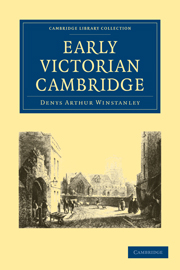Book contents
- Frontmatter
- Contents
- Preface
- Chapter I THE FOUNDATION OF DOWNING COLLEGE
- Chapter II A COLLEGE ELECTION
- Chapter III UNDERGRADUATES IN BONDS
- Chapter IV THE ATTACK ON HEADS OF HOUSES
- Chapter V CHRISTOPHER WORDSWORTH
- Chapter VI THE RELIGIOUS TESTS
- Chapter VII CHANCELLORS AND HIGH STEWARDS
- Chapter VIII TOWN AND GOWN
- Chapter IX TROUBLE AT THE FITZ WILLIAM
- Chapter X INTERNAL REFORM
- Chapter XI THE ROYAL COMMISSION
- Chapter XII BETWEEN THE TWO COMMISSIONS
- Chapter XIII STATUTE XLI AND THE THREE REGIUS PROFESSORSHIPS
- Chapter XIV THE STATUTORY COMMISSION AND THE UNIVERSITY
- Chapter XV THE STATUTORY COMMISSIONERS AND TRINITY COLLEGE
- Chapter XVI CAMBRIDGE AS IT WAS
- Appendices
- Index
Chapter XV - THE STATUTORY COMMISSIONERS AND TRINITY COLLEGE
Published online by Cambridge University Press: 07 September 2010
- Frontmatter
- Contents
- Preface
- Chapter I THE FOUNDATION OF DOWNING COLLEGE
- Chapter II A COLLEGE ELECTION
- Chapter III UNDERGRADUATES IN BONDS
- Chapter IV THE ATTACK ON HEADS OF HOUSES
- Chapter V CHRISTOPHER WORDSWORTH
- Chapter VI THE RELIGIOUS TESTS
- Chapter VII CHANCELLORS AND HIGH STEWARDS
- Chapter VIII TOWN AND GOWN
- Chapter IX TROUBLE AT THE FITZ WILLIAM
- Chapter X INTERNAL REFORM
- Chapter XI THE ROYAL COMMISSION
- Chapter XII BETWEEN THE TWO COMMISSIONS
- Chapter XIII STATUTE XLI AND THE THREE REGIUS PROFESSORSHIPS
- Chapter XIV THE STATUTORY COMMISSION AND THE UNIVERSITY
- Chapter XV THE STATUTORY COMMISSIONERS AND TRINITY COLLEGE
- Chapter XVI CAMBRIDGE AS IT WAS
- Appendices
- Index
Summary
The Statutory Commissioners, as they probably anticipated, encountered far greater resistance from the colleges than from the University. It was their duty to press reforms which threatened fundamentally to change the character of college life, and they were therefore suspected of a design to destroy a great heritage. Many of the Fellows were blinded by familiarity to defects and abuses which were very obvious to more detached observers, and, even when they partially recognised them, they were inclined to minimise them. They believed, rightly or wrongly, that their college had prospered under the statutes which were being assailed, and feared that it might not continue to do so if the old order gave place to a new. By no means all of them were reactionaries opposed to any change, and some of the most vigorous protests came from those who had constantly been urging the University to throw off its mediaeval trappings. The leader of the academic reform party, Adam Sedgwick, unmistakably flinched from the spectre of reform when it appeared on his own hearth, and many of his followers were no more courageous.
Each college waged its own battle with the Commissioners, and the contests varied in intensity. Jesus, for instance, was particularly recalcitrant, having Dr Corrie as its master; while King's was commended by the Commissioners for its “candid and friendly disposition”. A readiness to accept reform was, however, exceptional, and most of the colleges desired to remain much as they were.
- Type
- Chapter
- Information
- Early Victorian Cambridge , pp. 339 - 372Publisher: Cambridge University PressPrint publication year: 2009First published in: 1940



